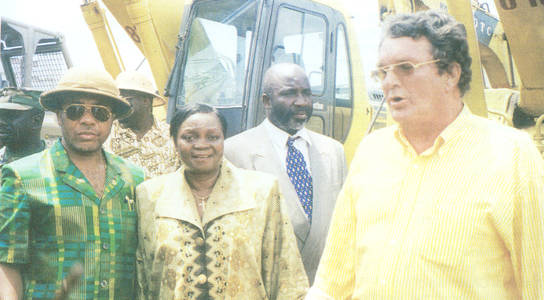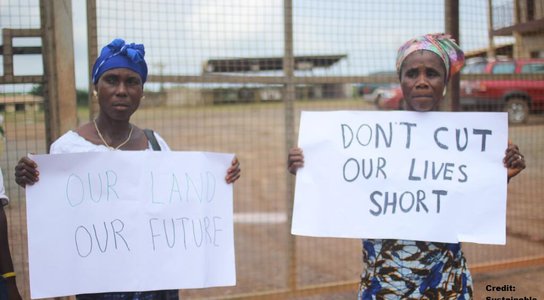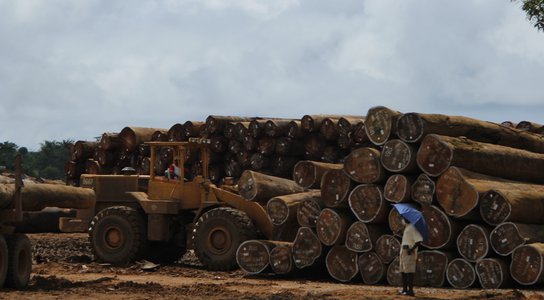Global Witness and Tropenbos International condemn new law that rewards logging companies at the expense of Liberia’s people and call on Liberia’s donors to halt their support until it is overturned
The Liberian government has secretly given the country’s loggers a US$13 million tax break, subsidising companies at the expense of the country and forest communities. International NGOs Global Witness and Tropenbos International say the move has undone 15 years of reform.
Signed by Liberia’s President – and lauded economist – Ellen Johnson Sirleaf, the law knocks a massive hole through Liberia’s budget. It also undermines the country’s efforts to mitigate climate change through preserving its forests and managing them for the benefit of its people.
David Young, Campaign Leader at Global Witness said: “This is a disastrous move, which puts back efforts to halt climate change, whilst also massively short-changing the Liberian people. With such economically-irrational decisions being made on the future of Liberia’s forests, it is only right that partners providing budget support to Liberia and aid to its forest sector should now suspend that support until the law is overturned.”
The law, known as the Forest Industrial Development and Employment Regime Act, was passed in October but only made public last week, at the height of Liberia’s election season. (1)
It effectively writes off US$13 million of Bid Premium (2) payments, funds owed by Liberia’s logging companies to the state and accrued over the past ten years. (3) For the next three years the companies will not need to pay what they owe. And the companies will be able to claim ill-defined “investments” accrued between 2016 and 2020 against this tax bill. Given the dismal state of companies’ past “investments,” not to mention their persistently poor delivery on their obligations to forest communities, (4) it is hard to see how this could possibly be in the interests of the Liberian people.
Young said: “There is no logical explanation for why Liberia should be subsidising loggers who have persistently broken the law and now are failing even to pay the taxes they owe. Liberia is one of the world’s poorest countries, with projected budget in 2017-18 of just US$563 million (5) – this money would have made a huge difference to the Liberian people. Given the extent of high level corruption in Liberia, the inescapable question is what is motivating the government to do this?”
The law also comes as a surprise given the heavy investments made by the UK, Norway, EU, and the US in reforming the forest sector and supporting the country’s poor finances. Donors contribute heavily to improving the rule of law in the forest sector and fighting climate change, including through a US$150 million agreement between Liberia and Norway. The EU not only helps the Liberia’s Forestry Development Authority, but between 2011 and 2015 also provided nearly US$ 128 million to boost the country’s budget.(6)
Young added: “The choice is a stark one for Liberia’s donors: why should they spend millions helping Liberia, only for the Liberian government to give millions back to predatory logging companies? President Johnson Sirleaf should immediately issue an Executive Order overturning the law. Until she does, funds provided by the UK, Norway, EU and US for the forest sector and budget support should be suspended.”
/ ENDS
Contacts
Notes to editor:
(1) A copy of the law is available on request. A previous law (also available on request), passed in 2011, reduced the Bid Premium by a factor of 25, from an annual payment over the 25-year duration of a logging contract, to just a single payment.
(2) Bid Premiums are area-based payments based on the amount a logging company volunteered to bid in the original auction to obtain the permit. Logging companies have resisted these payments despite – once awarded the permit – they are required by law. Over the past year, the government, its international partners, and NGOs have increased pressure on companies to pay what they have so long owed. Now, it appears however, the government has conceded to under-capitalised cut-and-run loggers.
(3) Forestry Development Authority, Monthly Revenue Report, October 2017. The total indebtedness of the 19 operational logging companies to the state, as of 30 October 2017, is US$ 24,900,434.14 of which US$ 13,447,427.90 is Bid Premiums.
(4) Civil Society Independent Forest Monitoring Team, Briefing 3, December 2014; Briefing 1, November 2013; Liberia Social Audit 2012/13: assessing the forestry sector.
(5) Ministry of Finance, Budget FY 2017-2018, 6 October 2017.Total adjusted revenue for financial year 2017/18 is US$ 563,563,432.
(6) OECD, Budget Support by Country, accessed 18 December 2017. General budget support commitments to Liberia in the period 2011-15 totalled US$ 127,569,000 from European Union Institutions, and US$ 5,355,000 from the United States. The European Union has pledged US$ 11.2 million for 2017.
Tropenbos International works alongside Global Witness and other international NGOs in supporting Liberia non-state actors to improve policy and practice in forest law enforcement, governance, and climate mitigation.
You might also like
-
Press release Convicted arms and conflict timber trafficker Guus Kouwenhoven arrested for role in Liberia’s civil war
We welcome news that Guus Kouwenhoven, notorious Dutch trafficker of arms and conflict timber, has been arrested for his actions in fuelling and profiting from Liberia's bloody civil war.
-
Press release Liberian legislature must ensure Lands Rights Act protects rural landowners
Liberian legislature must ensure Lands Rights Act protect rural landowners
-
Blog post A new film, Silas, premiering at the Toronto International Film Festival, highlights the struggle to fight Liberian land grabs
The heart-breaking story of how rural Liberians’ land and forests has been seized by foreign companies, and how some Liberians are taking a stand against it, is the focus of a new film premiering at the 2017 Toronto International Film Festival.